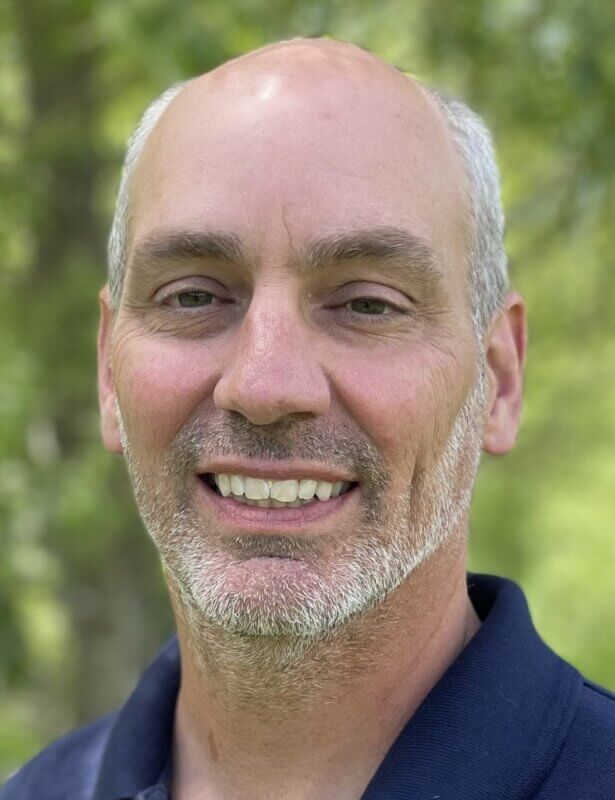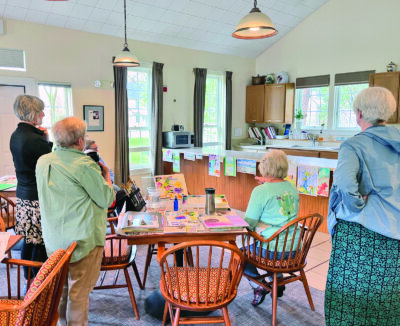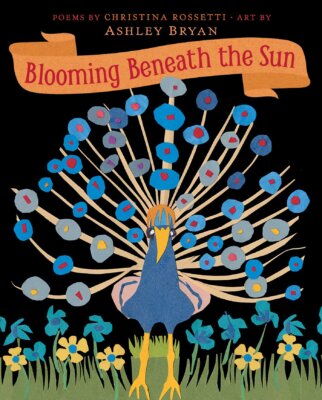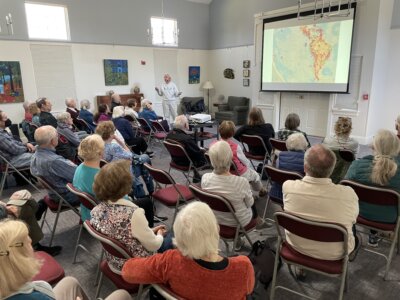A magic show that dazzles and instructs appears at senior center
In the belief that sometimes refugee children need more than just medical attention, that they might need some magic, Tom Verner and Janet Fredericks founded Magicians Without Borders 22 years ago.
In the intervening two decades, they have brought their magic to 1.5 million young refugees and orphans in 47 countries.
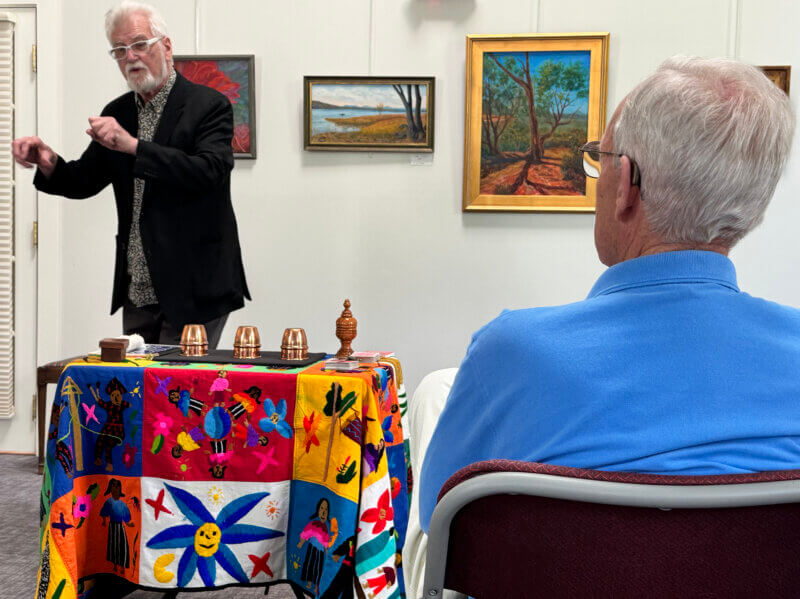
You might say that Hank Kaestner was spellbound by Tom Verner’s demonstration of the ancient cups and balls magic trick.
You can add to the tally of those who have been touched by the magic of Magicians Without Borders — the 15 people who showed up to the Charlotte Senior Center on May 14 to see Verner perform with the help of two teenage magician’s assistants.
Magicians Without Borders has grown to nine chapters around the world in countries including Brazil, Colombia, Costa Rica, El Salvador, South Africa and India. From these chapters, they have recruited “Sorcerer Apprentices,” or very poor kids the couple teach to abracadabra in order to entertain, educate and empower them, Verner said.
Two years ago, they started a Sorcerer Apprentice chapter in Ukraine, and they are headed back there this week.
“We’ve performed for tens of thousands of refugee children,” Verner said. “It feels like now, more than ever, we need to go to Ukraine.”
Fredericks sees their role as citizen diplomats in going to these refugee camps.
Among those touched by their magic, is Wendy Rodriguez who came up at a performance and said, “I always wanted to be a nurse.”
She sold beans in the marketplace for 75 cents a day. One of their adult students, who had traveled to El Salvador with them to practice magic, heard Rodriguez’s story and set up a scholarship for her.
Wendy is now a geriatric nurse who makes more in an hour than she used to make in a month. She has built her mother a house and inspired her sister to go back to college. Hers is just one of many stories told on magicianswithoutborders.com about those who have been have been transformed by magic.
Besides magic, the audience at the senior center got a history lesson. Verner pulled out some cups and balls, introducing this as the oldest magic trick in the world. A 3,000-year-old Egyptian carving depicts two men doing this trick.
The cups and balls trick is done around the world. In Japan, Verner said, it’s done with little bamboo baskets. In India, it’s performed with little round cups with handles on top, in the Middle East with clay cups.
“The Lakota Sioux, the great mystic warriors of our Plains, did this with boxes,” he said.
In the U.S., it is often used as a gambling trick called the shell game.
As Verner wove a spell of history mingled with magic, he demonstrated why he is someone you would never want to gamble against. He started with a red ball. As anyone over the age of 6 would probably expect, after the ball was placed under a cup and the cups were shuffled, volunteers were repeatedly unable to figure out which cup the ball was under. Then it was two balls under the unexpected cup, and then three.
Then, when Verner lifted a cup, instead of a red ball, a clementine was there. When covered and uncovered again, the clementine had transformed into a potato, which transformed into an egg, before finally being revealed to once again being the red ball.
Next, he performed what he said is the world’s second oldest trick — the rope trick.
As many times as you may have seen this trick on TV or large audiences, it was particularly amazing to see it up close as three different lengths of rope became one long rope or a rope loop with no visible breaks or blemishes. Also amazing was how he repeatedly tied a knot in a rope and then pulled those knots off and displayed them as separate little chunks of rope knots.
A spectator “cut” the rope using his two fingers as scissors, and the rope fell into separate pieces.
Verner was joined by his two adolescent assistants, his granddaughter Amaya Freund and Yasmin Artis, who performed magic themselves — much to the delight of the audience.
And much to the delight of her grandfather. Afterward, Verner said performing with his granddaughter is like a dream come true.
“I perform at a resort in the Adirondacks once a week all summer, a place called Timberlock on Indian Lake. Last summer, she performed with me,” he said. “Then in November, we went to India together, and she performed in orphanages and hospitals. Yeah, it’s really wonderful.”
Verner has toured veterans administration hospitals in New England, training veterans to be magicians. He calls them “Warrior Wizards,” who travel to VA hospitals or perform at events for vets and their families.
As audience members were called up to help with the prestidigitations, each was asked for their favorite incantation. Abracadabra and shazam were suggested and each worked their magic, but when hocus pocus was offered, Verner lapsed into another historical sidenote.
It seems that, during the Middle Ages, there was a holiday called the Feast of Fools, which was celebrated by turning all the procedures and roles in a town upside down. For instance, the town drunk would become the bishop for the duration of the celebration.
“The village idiot would become the president. Oh, did I just say that?” Verner faux apologized. “That was a little politics in there. Sorry about that.”
The most holy words in the Catholic mass are “hoc est enim corpus meum” or “this is my body” in English. According to Verner, the town drunk usually didn’t know Latin, and as he stumbled over the words, it sounded like “hocus pocus,” and hence this conjuration was born.
In the 1970s, Verner was working as a clinical psychologist in a residential drug-and-alcohol hospital where there was a patient who was a professional magician. He had lost everything because of his heroin addiction.
The patient was reluctant to share his magic secrets, however when Verner was assigned his case for individual psychotherapy, the patient relented.
“He came to the first hour-long session and said, ‘OK, Verner, 50 minutes are mine and 10 minutes are yours.’ So, for two years, he taught me magic 10 minutes a week,” Verner said.
The patient was very strict. If Verner hadn’t practiced and learned the trick he’d been shown in their previous session, the patient wouldn’t share a new trick during Verner’s 10 minutes of their session.
After two years, Verner’s patient graduated from the residential treatment center. In his new life he became a barber because making a living as a magician is just so hard, while continuing as a performing magician on the side.
For a many years, Verner was a practicing psychologist, a college professor and a professional magician, so in addition to practicing magic, he was practicing juggling … in this case, three jobs. Then, he and his wife founded Magicians Without Borders and began traveling to refugee camps around the world.
They live in Lincoln and have taught magic classes at Lincoln Community School, but those have stopped for summer vacation and for the Ukrainian refugee camp trip. After the trip, they might offer a summer magic camp for all ages, if there is enough interest.
If you are interested in improving your “spelling” or in supporting the organization’s refugee efforts, go to magicianswithoutborders.com or call 802-453-5425. You might find some of your free time disappearing, while your sense of accomplishment materializes.
Related Stories
Popular Stories
If you enjoy The Charlotte News, please consider making a donation. Your gift will help us produce more stories like this. The majority of our budget comes from charitable contributions. Your gift helps sustain The Charlotte News, keeping it a free service for everyone in town. Thank you.
Bill Regan, Chair, Board of Directors
